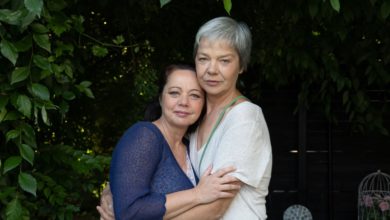Getting to know things is not a taboo at LIFT
The Getting to Know LGBT People Labrisz Lesbian Association’s Háttér-award winner school sensitising program is 15 years old. The MM program (shorthand for its Hungarian name) was created to dissolve the taboo around being gay in schools but the activists giving these classes take steps not only for the freedom of communication. The MM activists have been working on developing the LGBT community and sensitising young people for 15 years. In 2002 Szimpozion Association joined the cause and it has been their joint venture ever since.
The Beginning
Labrisz created the MM program in 2000 with the support of the EU’s PHARE Democracy Project. Their primary goal was to help create a school environment among students and teachers where people respect diversity and no one becomes the target of harassment for identifying as gay, lesbian or bisexual.
The concept was that a woman and a man tell their own personal stories through which they explain basic concepts of equal opportunity and talk about being gay or lesbian to the audience. These classes also present an opportunity to counter common misbeliefs about gay people.
What does the program offer?
It is an important and vital cause to make sure that neither students nor teachers are forced to live their lives in shame and stigmatization within the school walls but that they should be free to express their identities. Obviously this is about being open about their sexual orientation.
The main method of the MM program is that the activists don’t try to directly convince people, they only sensitise them. An MM class basically means a friendly discussion while sharing a lot of information. People can talk about having children, relationships, the relationship between religious and gay identities or family acceptance at a personal level. On a social level, they can discuss stigmatization, the importance of coming out, workplace acceptance and discrimination, human rights and the gay parade, which has been a leading topic for years both during these classes as well as in public discussion.
During these classes both students and teachers get a more complex picture of gay people, their social status and personal problems. Hopefully the students in secondary and higher education find the information they get from the school useful in their everyday lives.

Successes and difficulties
In practice, it doesn’t work so smoothly, but it’s worth the energy we put into it despite the difficulties. The project often meets discouraging forces either from educational policies – it even met Parliamentary opposition in the first few years – and every year since people try to force the program out of the schools. But attacks also come in the form of face-to-face homophobic comments during or after the classes in the schools themselves. But these negative reactions are constructive from the program’s point of view. Instead of weakening the project, these moments give more strength to it, proving that indeed there is great need for it, validating the activists’ work.
It’s obvious that their work is not in vain: there are many examples where they managed to break the taboo and people’s views became more positive. The positive feedback gives strength and a new momentum to the speakers. Sometimes the activists find themselves in a friendly and open environment even before giving the classes. This is more and more typical of both students and teachers.
In addition, the program gets support both in the form of voluntary work and financial aid. Every year 10-15 new volunteers join the program which enables tired activists who want to take a break and step down for some time to help the new joiners with their experience. The Norwegian Civil Fund gave the program a 27-month-long fund that the two associations use to develop the learning material, supply the available material for teachers and volunteers, to involve countryside volunteers and to cooperate with other minorities.

Are you wondering what happened during the 27-month developmental program? What are the future plans of the MM program? Come to the 10th LIFT where you’ll get answers to your questions. Be open about discovery!
Author: Mihu
Translation: Rhyenna
The online program booklet of this year’s LIFT (in two languages) is available on the following link: http://www.labrisz.hu/10-lift-programfuzet
For more information on the organization of LIFT and details about each workshop see the Facebook page of the festival: https://www.facebook.com/liftfesztival
The photos are illustrations. Photos: Tea Erdélyi, Zsolt Virág, Ilona Csécsei







